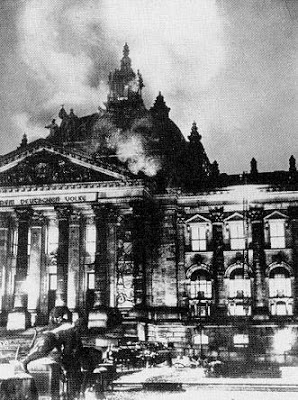 Reichstag Fire, 1933.
Reichstag Fire, 1933.DAVID GREGORY: In that vein, House Speaker Pelosi worried about the opposition, the tone of it, perhaps, leading to violence as it did in the 70s. There's more recent examples of antigovernment violence— occurring even in the mid 90s. Do you worry about that?
PRESIDENT OBAMA: Well, look— I think that we have an obligation in Washington, as leaders, to make sure that we are sending a strong message. That we can disagree without being disagreeable. Without— you know, questioning each other's motives. When we start caricaturing the other side— I think that's a problem. -- Meet the Press, 20 September 2009.
Later in the show, he asked the GOP the same question:
MR. GREGORY: This question about the role of the government, and, and House Speaker Nancy Pelosi saying this week what she worries about in terms of the tone of debate is that it could lead to violence, as it did in the ‘70s; you know, there was anti-government violence in the ‘90s in Oklahoma City, as well. How much of a concern is that? Do you share it, or do you think that that was an overstatement on her part?
SEN. GRAHAM: Well, quite frankly, I mean, the whole idea of the role of government needs to be debated. . . But I’m not so worried about—you know, her criticism about the opponents of the plan don’t bother me. The fact that we’re broke...
MR. GREGORY: She’s talking about violence, though.
SEN. GRAHAM: Yeah. I don’t...
MR. GREGORY: I mean, we’ll get to the health care. You don’t buy that.
SEN. GRAHAM: I don’t think any responsible person is asking for a violent response.
MR. GREGORY: Do you—is that hyperbole?
REP. BOEHNER: David, I’m, I’m not concerned about violence.
SEN. GRAHAM: No.
REP. BOEHNER: I mean, I’m sure Speaker Pelosi was sincere in her concern. But let’s remember something. The debate that we’re in here is not just about health care, it’s about the, the trillion-dollar stimulus that was suppose to be about jobs and turned into nothing more spending—than spending and more spending. . . You add to that this whole question of health care and the government option, the government involvement, and Americans today are getting more news about what’s happening in their government than they have ever gotten before, and Americans are genuinely scared to death. Scared to death...
Now here's something some of you may remember. Gregory covered the Oklahoma City bombing trials for NBC. There, he met and later married Beth Ann Wilkinson, Assistant U.S. Prosecutor in the case. Of course, I'm certain that dating the fed's cover-up queen there in Denver didn't bias his coverage one bit. Journalistic ethics being what they are, and all.
 David Gregory and Beth Ann Wilkinson. She wears the pants in the family.
David Gregory and Beth Ann Wilkinson. She wears the pants in the family.Now Beth Ann is a piece of work. From Wikipedia:
Beth A. Wilkinson is a prominent Washington, D.C. lawyer, and partner in the New York City-based law firm Paul, Weiss, Rifkind, Wharton & Garrison. She works in the firm's Washington, D.C. office focusing on white collar criminal defense. Wilkinson is well-known for successfully arguing for the execution of Oklahoma City bomber Timothy McVeigh. She has also been a critic of unfair administration of the death penalty.
Wilkinson graduated with a B.A. from Princeton University in 1984,and from the University of Virginia Law School with a J.D. She joined the United States Army's Honors Program and served as a captain and assistant for intelligence and special operations in the office of the Army's general counsel. That office detailed her as a Special Assistant U.S. Attorney for the Southern District of Florida to assist with the use of classified information in the prosecution of Panamanian military leader Manuel Noriega. After completing her four-year obligation to the Army, Wilkinson became a full-time Assistant U.S. Attorney for the Eastern District of New York in 1991, prosecuting various kinds of cases including narcotics, white collar offenses, and violent crimes. Among her cases was the first United States prosecution of a bombing of an airliner—the 1994 case against Colombian narcoterrorist Dandeny Muñoz Mosquera, whom she successfully prosecuted for the bombing of an Avianca civilian airliner as well as murder of U.S. citizens and other drug-related crimes.
Wilkinson won the Justice Department's highest honor, The Attorney General's Exceptional Service Award, for her work on the Mosquera case. She then became special counsel to the deputy attorney general, advising the top management of the Department on criminal policy and investigations. She was promoted to principal deputy of the Department's Terrorism and Violent Crime Section, and it was in that capacity that she participated in the trial team in U.S. vs. McVeigh and Terry Nichols. She won the Attorney General's Exceptional Service Award an unprecedented second time. . .
In 2006, Fannie Mae recruited Wilkinson as parts of its effort to rebuild its relationship with regulators after accounting scandals and complaints about its corporate culture. Her compensation at Fannie Mae was not disclosed when she was hired. She served as Fannie Mae's executive vice president, general counsel and corporate secretary from February 2006 until September 2008. She resigned her position at Fannie Mae along with three other senior executives on September 19, 2008, after the troubled mortgage giant was taken over by the government.
In 2009, Wilkinson was elected to partnership in the prominent New York City law firm Paul, Weiss, Rifkind, Wharton & Garrison LLP. According to the firm's website, Wilkinson's practice will focus on general litigation. She is married to David Gregory, the moderator of NBC News' Meet the Press. They have three children.
Described by even her friends as "tough as nails," Wilkinson was entrusted with keeping the secrets of the OKC Bombing conspiracy that the Clintonistas wanted kept out of the courtroom. Those secrets included anyone who had evidence of a wider conspiracy, but especially Carol Howe, paid confidential informant for the ATF who warned them about another federal informant and provocateur, the German national, Andreas Carl Strassmeier. After the ATF began to act on her information and planned a raid of Elohim City, the FBI and the US Attorney's office for Oklahoma City had a meeting with the ATF in Tulsa at the end of February, 1995. The ATF was told to "back off, Elohim City is our operation." So they did. Eventually, a federal building with a lot of innocents in it blew up. (This is one you can't blame the BATFags for. The FBI owned this one from the beginning.)
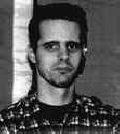
"Andy the German," Security Chief at "Elohim City," an Indentity compound in eastern Oklahoma, and base of the Aryan Republican Army.
To see how this fits together with Wilkinson, Gregory and Company, read this story from years back by my friends J.D. Cash and Roger Charles. It is long, certainly, but worth the read. I'll have comments on the other side.
Southern Poverty Law Center tracked bomb plot around the globe
By J.D. Cash and Lt. Colonel Roger Charles (U.S.M.C. retired)
Newly released documents received by a Salt Lake City attorney in his suit against the Oklahoma City FBI office provide the strongest evidence yet that the U.S. Department of Justice (DOJ) has been conducting a well-orchestrated cover-up of evidence linking Timothy McVeigh to subjects that frequented, and in some cases resided, at an eastern Oklahoma paramilitary compound called Elohim City.
At the center of this cabal were numerous informants. At least two of those providing critical information about the Elohim City conspiracy reported to a tax-exempt civil rights group, the Southern Poverty Law Center (SPLC), headed by Morris Dees.
Perhaps even more surprising is evidence in these 87 pages released by DOJ on behalf of the FBI and the Oklahoma City FBI office, is documentation showing that top FBI agents assigned the bombing case lacked authority to conduct interviews at Elohim City or to go after a leading suspect in the case, Andreas Carl Strassmeir, also known as "Andy the German."
While the state's media ignored (and some even attacked) evidence this newspaper presented nine years ago linking McVeigh, Terry Nichols and Mike Fortier to Strassmeir and other radicals at Elohim City, these new but heavily redacted documents should provide a starting point for a real investigation into the horrific crime and apparent government sponsored cover-up.
Morris Dees, malignant Federal running dog whose informants knew about OKC conspiracy. Morris did nothing with the information, before or after the slaughter. (My apologies to honest Oompa Loompas everywhere.)
Trentadue suit
After months of legal wrangling in a Salt Lake City courtroom, the DOJ reluctantly turned over 17 FBI-generated documents Friday, to the plaintiff in a Freedom Of Information Act (FOIA) lawsuit n Jesse C. Trentadue.
Trentadue, a well-respected Salt Lake City lawyer whose client list is made up of members of the insurance industry, became embroiled in the Oklahoma City bombing case after his brother was found beaten to death in his jail cell at the Oklahoma City Federal Transfer Center in August 1995.
Initially, the federal government ruled Kenny Trentadue's death a suicide, in spite of many indications that pointed to his having been beaten to death. The Trentadue family and local investigators tried to obtain definitive proof of his murder, but were thwarted by actions of FBI and Bureau of Prison employees who allegedly destroyed evidence in the case.
After information was passed to him from an intermediary serving time at a Terre Haute, Ind., federal prison with McVeigh, Jesse Trentadue sought evidence of his brother's death inside the OKBOMB investigation files.
McVeigh's message offered an explanation as to why such extreme measures had been undertaken by federal officials: Kenny Trentadue was tortured by federal agents who may have mistakenly thought he was a member of the bombing conspiracy.
With this tenuous lead from McVeigh, the dead man's brother filed a FOIA request for documents that could shed light on his brother's brutal murder and the OKBOMB case.
In the course of his investigation, evidence emerged in documents Trentadue received that the FBI was using the SPLC to gather information on Elohim City n both before and after the bombing.
After months of legal maneuvering by the DOJ and the FBI, U.S. District Court Judge Dale Kimball ruled on May 5, 2005, that the Oklahoma City FBI office had to search for documents linking the SPLC to Elohim City and/or specific individuals connected to the April 19, 1995, bombing.
With national attention on the case provided by several news agencies, the FBI released a small portion of what may prove to be a large reservoir of hidden documents that could reveal more sensational details about a widespread cover-up.
The DOJ cover letter accompanying the newly released documents claimed the release to Trentadue was done as "a matter of discretion, in the interest of resolving the litigation in good faith." The earliest date on these documents is a teletype transmitted on April 24, 1995 n only three days after McVeigh was first publicly identified as a prime suspect in the bombing of the A.P. Murrah federal building.
While each of the 17 reports is heavily redacted, central to these-never-before-reported-on documents is evidence that the Southern Poverty Law Center headquartered in Montgomery, Ala., was monitoring neo-Nazi radicals closely associated with McVeigh, if not McVeigh himself, shortly before McVeigh's deadly attack.
Leaked teletype first disclosed SPLC connection
What started this latest litigation was an article first reported by this newspaper on Dec. 14, 2003. The copyrighted article provided details of a teletype sent by the director of the FBI to a select few FBI offices, disclosing that Morris Dees' SPLC had at least one informant at Elohim City on April 17, 1995, when McVeigh called the camp.
The name of the individual to whom McVeigh placed this call is redacted in the FBI teletype, but a phone card shows at another time McVeigh called Elohim City to speak to Strassmeir.
Strassmeir was providing paramilitary training to the neo-Nazis who frequently cycled through Elohim City. This January 4, 1996, FBI teletype also documents an April 5, 1995, telephone call from McVeigh to Elohim City, characterizing this call as an attempt by McVeigh "to recruit a second conspirator to assist in the OKBOMB attack.
One of the newly released FBI documents, dated January 26, 1996, provides support for the accuracy of the SPLC informant's characterization of McVeigh's April 5 telephone call as a "recruiting" call.
In this newly disclosed report, the FBI notes that Fortier, identified as "the OKBOMB cooperating subject" (but with his name redacted), as having said that, "April 5, 1995, was around the time that he backed out of the plans to bomb the federal building. McVeigh may have been trying to recruit other individuals to assist him."
This new evidence from the top echelons of the FBI directly contradicts many statements made in federal court by top DOJ officials, who told federal judges they were not aware of any government information about any informants operating inside Elohim City before the bombing.
In closed chambers, DOJ lawyers told U.S. District Judge Richard Matsch that they had no evidence linking anyone at Elohim City to McVeigh, or the bombing, other than a calling card record showing McVeigh had called the camp a single time on April 5, 1995.
Furthermore, these same DOJ attorneys said absolutely nothing about an April 17, 1995 call by McVeigh, while at least one operative from the SPLC was present at Elohim City, monitoring the compound, when McVeigh called.
Stephen Jones, McVeigh's attorney at that trial, indicated that the new documents show prosecutors violated ethical standards.
"These hand-picked DOJ lawyers were obligated by law and by their professional code of ethics to provide this information to Judge Matsch in order for him to determine if the material should be turned over to the McVeigh and Nichols defense teams. They did not do so," he said.
Conspiracy closely monitored
Taken in their entirety, Utah attorney Jesse Trentadue's latest documents clearly place the role of the SPLC and its own undercover operatives at the center of unresolved issues about federal law enforcement's prior knowledge of the conspiracy to bomb a federal building in Oklahoma City on April 19, 1995.
In addition, the documents also show that members of the DOJ prosecution team misrepresented to U.S. District Judge Richard Matsch the true extent of government files about McVeigh's ties to Elohim City, potentially opening them up to criminal prosecution and disbarment for these misrepresentations.
One of those documents indicates that on April 24, 1995, a top DOJ lawyer in the civil rights division, Barry Kowalski, reported that he was seeking an interview with a key undercover SPLC source about relations the source had developed regarding, "relationships, activities, and/or associates of subject number one, Timothy J. McVeigh."
Indeed, the FBI was using a spy network operated by the SPLC to do what many in the FBI were afraid to do because of guidelines in place during the Clinton administration.
According to a highly placed confidential source in the DOJ at the time of the bombing, Attorney General Janet Reno would not allow the FBI much latitude in developing intelligence inside the far-right due to concerns that such activities might violate existing departmental guidelines on "domestic spying."
To skirt Reno's policies, the FBI developed a relationship with cutouts such as the SPLC that could use their own spies to do what the FBI could not. These non-government agents then passed their intelligence products back to the bureau.
Dees confirms relationship
In December 2003 this newspaper presented SPLC co-founder Morris Dees with information that linked his organization to the FBI and to McVeigh's conspiracy in the months before the Ryder truck exploded.
Dees confirmed to the Gazette a role in the surveillance operation at Elohim City (and other places) when reporters interviewed him at a press conference in Durant.
Dees was initially taken aback when he learned that the newspaper had obtained an officially released FBI teletype from director Louis Freeh, including information attributed to an SPLC informant who was present Elohim City on April 17, 1995, when McVeigh called him to seek help in the bombing.
Dees admitted that he had an informant at Elohim City as the teletype said. However, the coy attorney refused to elaborate on the situation, except to say he had warned then-attorney general Reno, six months before the attack, that, "(A)n attack on the government is planned by members of the far right."
Dees went on to say that after the attack he immediately called Reno to say the media had it wrong.
"I told her the attack was domestic, not foreign," Dees said.
The co-founder of the SPLC also said that he did not know McVeigh by name before the blast. However, Dees did become visibly shaken when asked what he thought of German-national Andreas Strassmeir.
"I won't ever discuss that man," Dees said as he spun away from the interview and left the press conference with his armed bodyguards in tow.
Book discloses informant
In the newly released April 24, 1995, teletype, the FBI and DOJ redacted the name of the SPLC agent, but described him as "acting in various undercover capacities for the purposes of gathering intelligence for that organization [the SPLC]."
Dees, on the other hand, had no such concerns about identifying this operative in his 1996 book, "Gathering Storm: America's Militia Threat." There he described Mike Reynolds as "one of our [SPLC] Militia Task Force investigators." Dees' description of Reynolds' itinerary for the period in question perfectly fits the description in the April 24 teletype.
The EC connection
An appraisal of the new documents shows that almost immediately after the bombing, elements within the FBI sought information about Strassmeir, the paramilitary leader at Elohim City. And the information was sourced through Dees' information network at Elohim City, according to these same FBI documents.
The first report provided by the Oklahoma City FBI office concerning the SPLC's intelligence operation was prepared on April 24, 1995, and discusses McVeigh's links to the Michigan Militia and to the Arizona Patriots militia group n a group that the SPLC informant stated had evolved into the Constitution Ranger's militia group.
The informant cited this latter group's involvement in white supremacist activities in the Kingman, Ariz., area and claimed to be knowledgeable "of the identities of various members who had association with Timothy Jack (sic) McVeigh."
The FBI document said this SPLC informant had just attended an neo-Nazi movement rally and as of April 24 was staying at the Hilton Inn in Little Rock when the FBI attempted to make contact, but had departed for the Montgomery, Ala., area "within the past one hour."
But the initial report from the Oklahoma City FBI office does not mention the fact that at least one, and very likely two informants for the SPLC were at Elohim City on April 17, 1995, when McVeigh made the call never disclosed by the DOJ to Judge Matsch.
Those details would not come out for many months, and then only after the FBI learned that one of the reporters for this story (J.D. Cash) and an investigator for McVeigh's defense team were making regular visits to Elohim City.
In January 1996, this newspaper began preparing a series of articles about Elohim City. Those articles were based upon multiple trips to the compound in late 1995.
According to people at the compound, McVeigh had visited the camp several times. The leaders of the camp, though, would make that information only on a non-attribution basis n out of fear, they said, that they would be linked to the bombing and arrested for conspiracy.
At one point in the questioning of Rev. Robert Millar, the aging patriarch of the Christian Identity community of about 80 persons, he admitted to McVeigh defense investigator Richard Reyna in the presence of a reporter for this newspaper that McVeigh's initial visit to Elohim City had been with former KKK leader Dennis Mahon of Tulsa.
Before long, several others provided the same details. McVeigh had traveled to Elohim City for meetings inside and outside the compound well over a dozen times, beginning in the fall of 1993.
One of the sources, an Oklahoma state trooper, had informants inside the neo-Nazi compound. A second source is none other than Morris Dees himself.
Reported by veteran reporter Howard Pankratz in the Denver Post, on May 16, 1996, Dees was quoted as saying that McVeigh has visited Elohim City,"…. on a number of occasions."
Sometime after that article appeared, Dees attempted to recant his declaration, claiming he had been misquoted, but the reporter who wrote the article was adamant that Dees had spoken as quoted in the article.
Contacted this week, Pankratz said he recalls attending the press luncheon and may even have Dees' comments on a tape.
"I kept all my Oklahoma City interview material," Pankratz noted. "Dees certainly never asked us to print a retraction of our story."
Suspects flee Elohim City
By the late summer of 1995, because of increasing media interest and law enforcement attention on Elohim City, several young men, including German National Andreas "Andy the German" Strassmeir, fled Elohim City n a neo-Nazi paramilitary camp in eastern Oklahoma.
Three of these men n Scott Stedford, Kevin McCarthy and Michael Brescia n were subsequently arrested for participating in a series of bank robberies in the Midwest and attempting to overthrow the government. The gang called itself the Aryan Republic Army (ARA). All three of these men shared living quarters at Elohim City with Strassmeir.
While the FBI for years told the media that the agency had no interest in Strassmeir and any alleged connections to Tim McVeigh and the OKC bombing, these new documents establish that some key officials inside the FBI were monitoring Strassmeir's escape from the U.S. n but were doing nothing to stop him from leaving.
Contained in an unclassified teletype marked "Priority" from the London FBI office to the director of the FBI on Jan. 4, 1996, the OKBOMB case number is referenced and the following information is provided:
"Poverty Law Center, Montgomery, Alabama who had received the following information from various confidential sources: [redacted name] white male, date of birth [information redacted] he was helped with [information redacted] also defends [information redacted]. Additionally in November of 1993, [name redacted] met subject Tim McVeigh (and) [name redacted] and thereafter, became associates with McVeigh because of their common background [information redacted] in the military. [name and information redacted] for the past few years at Elohim City, Oklahoma (a religious white supremacist community in a remote area) McVeigh attempted to call [name redacted] in April of 1995 prior to the bombing, according to this source. [name redacted] went on to provide additional information from his sources regarding [names and information redacted. Name redacted] concluded by advising that he has provided this information to the FBI because he has heard that LEGAT [legal attaché], London (FBI London) is doing background investigation on [name redacted]. "
LEGAT is the short name for the office of the FBI's Legal Attache at the specified U.S. embassy. The LEGAT is an FBI agent assigned to the staff of the U.S. ambassador for liaison duties with law enforcement officials in that foreign country.
The DOJ acknowledged that McVeigh called Elohim City on April 5, 1995, asking for Strassmeir. Both Strassmeir and McVeigh had common military experiences. Other sources confirm that LEGAT London was tasked to do a background investigation on Strassmeir. Given these facts, and the limited pool of "players," it is clear that the teletype mentioned above can only refer to Strassmeir, who was expected to flee the U.S. shortly, and did.
The document goes on to say: "Will advise Oklahoma City command post whether LEGAT is aware of any investigation [name and information redacted] by LEGAT, London, Scotland Yard, Interpol, or any similar agency in your jurisdiction."
Referring to the November 1993 trip McVeigh made to Elohim City, this newspaper broke a story on July 1 about an interview Terry Nichols gave Congressman Dana Rohrabacher, R-Calif.
That jailhouse interview included Nichols' admissions for the first time that in the fall of 1993 he and McVeigh traveled to Elohim City. During the course of the Rohrabacher interview, Nichols also told the congressman that it was clear to him that McVeigh had been to the compound before and knew Strassmeir and others there "very well."
DOJ officials hamper probe
Many of those new unclassified documents also establish that the OKBOMB task force was unable to interview subjects connected with Elohim City, because of conditions set forth by FBI director Louis Freeh and possibly other high ranking DOJ officials.
As an example: In a very unusual teletype, Jan. 29, 1996, marked "Priority" from the OKBOMB command post, which was headed at the time by Supervisory Special Agent Danny Defenbaugh, the commander of the massive investigation asked Freeh to locate Strassmeir in Germany and have someone question him about the numerous details set forth in newspaper articles detailing Strassmeir's connections to the bombing conspirators.
Not only were many of the names redacted from this priority teletype to Freeh; even the name of the newspaper breaking the Strassmeir/McVeigh/EC connections was withheld by the Oklahoma City FBI office.
However, based on the teletype's description of one of the informants providing information to the bureau, it is likely that Dennis Mahon is one of the sources referred to. The memo notes that Mahon (whose name was redacted) had a long history of contacts with members of radical rightwing and the skinheads. It also notes that the informant was recently barred from a particular foreign country he visited and stirred up trouble.
Indeed, Mahon had been barred from Germany for participating in Ku Klux Klan activities there during the timeframe mentioned in the teletype.
The FBI's Oklahoma City Command Post also said its informant provided information that Strassmeir had left Elohim City in the past few months and moved to Black Mountain, N.C.
The information was further verified by a "CW" n a Cooperating Witness n informant from the FBI's Cincinnati division n a man closely allied with the Aryan Republican Army (ARA) and a longtime source of information to the FBI.
That man's name is also known to this newspaper. He is Shawn Kenny, the former head of an Aryan Nations chapter in Ohio and a close associate of ARA bank bandits Peter Langan and Richard Guthrie (deceased). In fact, Kenny's work for the authorities in the OKBOMB investigation is mentioned several times in the new documents.
Referring to a number of newspaper articles linking Strassmeir to others, (whose names and locations at the time were redacted by the FBI) the Oklahoma City Command Post also lists a number of reasons why Strassmeir should be located by the FBI and questioned about the bombing and his alleged long association with McVeigh. Central to this plea by the OKBOMB case FBI commander is the evidence presented by this newspaper about Strassmeir and his associates, at Elohim City and elsewhere.
It is clear in January 1996 that members of the OKBOMB task force were very agitated about Strassmeir's flight from justice after they learned the news from an SPLC source.
Dated Jan. 26, 1996, the command post told Freeh and a select group of other FBI agents the following:
"As Charlotte [FBI office in North Carolina] is aware [name redacted] is of particular interest to this investigation because of his association to Elohim City (EC), a paramilitary survivalist compound located in eastern Oklahoma. McVeigh called the compound on April 5, 1995. As indicated in referenced teletype, information has been received from sources of [name redacted] indicating that [name redacted] met McVeigh [information redacted] and that McVeigh called the compound prior to the bombing asking for [name redacted].
"On January 26, 1996, Special Agent SA [name redacted] Mobile division, Montgomery resident agent advised she had received additional information from [name redacted] Southern Poverty Law Center, who advised the following: "He had just obtained information from a highly reliable source that [name redacted] had fled [location redacted] about seven days ago. The same source also said that [information and names redacted].
"Quoting another confidential informant [Kenny] based in Cincinnati, Ohio said he/she saw [name redacted] at [information redacted] in [location redacted]. At that time [name redacted (Strassmeir) said he left Oklahoma because, "things were too hot out there." Confidential informant clearly understood that [name withheld (Strassmeir) was referring to the bombing.
Defenbaugh's teletype next set forth a series of questions that Strassmeir should have to answer, if anyone could find him.
Regardless of the situation and Defenbaugh's pleas for assistance in the investigation, the Oklahoma City FBI documents do not provide any evidence that any FBI agent ever went to Berlin to do a face-to-face interview with the subject of so much pre- and post-bombing attention by federal agents and informants.
Instead, on April 30 and May 1, 1996, DOJ lawyers Aitman Goelman and Beth Wilkinson made two conference telephone calls from Denver to Berlin to interview Strassmeir. An FBI 302 obtained by this newspaper quite some time ago reveals only the most cursory interview of the subject, a conversation that Strassmeir later told a media source "lasted all of about five minutes."
According to the FBI 302, a single FBI agent was allowed to monitor the call and take notes. What few questions were asked of Strassmeir were very general in nature and asked only by Wilkinson and Goelman.
Wilkinson would later make light of Strassmeir's purported importance to the OKBOMB case by telling Judge Matsch that Strassmeir was "a mere wisp of wind." She promised the court that the German was never any interest to OKBOMB investigators.
"We never investigated Strassmeir," she told Matsch during a pre-trial evidentiary hearing Denver, "so we have nothing to turn over to Mr. McVeigh's lawyers about him."
Trentadue says he now intends to go back to court for additional information concerning files the FBI has not yet turned over.
"If the Southern Poverty Law Center was providing information about Elohim City after the bombing to the FBI, they must have been providing it before April 19th, Trentadue noted. Asking further: "So where are those reports?"
Trentadue also says there is considerable information redacted in these latest reports that clearly should not have been withheld.
"The names of certain newspapers were even withheld," Trentadue quipped. "Hell, where does the FBI get the right to withhold the names of the papers it reads?"
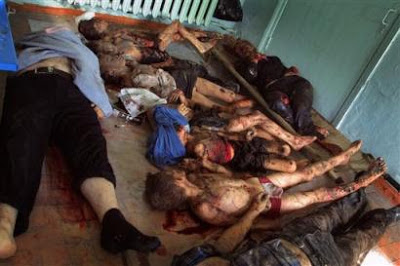
Collectivist tyrannies have a play book. One of the plays used by truly bestial governments is the Reichstag Fire scenario. The Russians have recently experienced this with the Beslan school massacre. Putin's poll numbers were failing. His Chechen war was unpopular. Presto! Some Muslim fanatics take over a school, the government's response guarantees a high death toll of children, and Putin's reputation is restored, with the nation demanding vengeance. Pictures of dead babies do it every time. The parents of the dead Beslan children suspect the Putin regime of orchestrating it. A reporer that got too close to the truth ended up dead. This is how tyrannies work.
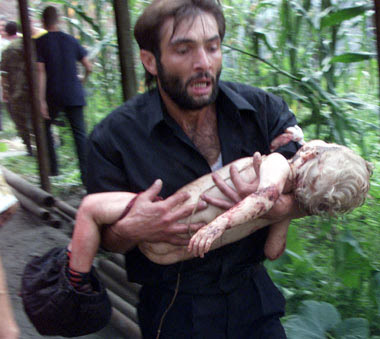
For his part, Bill Clinton told reporters after his re-election that "Oklahoma City broke the spell."
Now David Gregory, whose wife was deep into the OKC cover-up, predicts another Oklahoma City?
We should take him seriously.
More on this subject later this week.
Mike
III
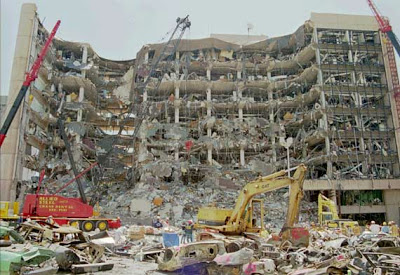
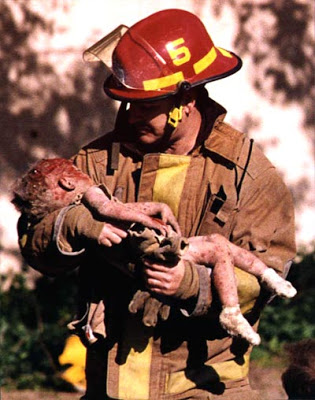
1 comment:
Check your drinks for polonium...
That was the calling card left by Litvinenko's murderers
Post a Comment